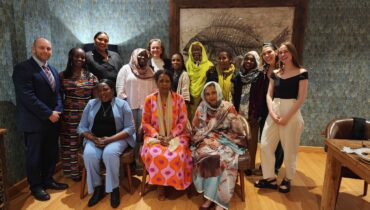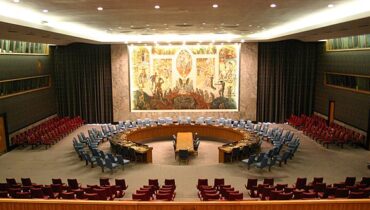The Georgetown Institute for Women, Peace and Security (GIWPS) returned to Dublin, Ireland to highlight women’s leadership in politics and peacebuilding across the island.
Former President of Ireland Mary Robinson and Northern Irish peacebuilder Monica McWilliams headlined a luncheon during Georgetown’s alumni reunion weekend to reflect on the conflict in Northern Ireland known as “the Troubles” that came to an end 26 years ago, and to discuss how the peace continues to be sustained. The session was moderated by Ambassador Melanne Verveer, who directs the Institute, and co-hosted by GIWPS, the Walsh School of Foreign Service, and the Georgetown University Alumni Association Women of Georgetown Initiative.
McWilliams spoke about the decades of sectarian violence between Protestant unionists, who wanted Northern Ireland to be part of the United Kingdom, and Roman Catholic nationalists, who sought a united Irish republic. McWilliams joined Protestant and Catholic women to form a cross-community Women’s Coalition. When there was an opening for peace talks in the 1990s, the Northern Ireland Women’s Coalition formed an official political party and ultimately earned seats at the peace table.
The women negotiators are credited with including topics that were important to their communities—such as housing, integrated education, victims’ rights, and reconciliation—into the resulting Good Friday Agreement.
“That’s the value-add that women bring to the table,” said McWilliams.
McWilliams is one of the few women to negotiate and sign a peace agreement: women constituted only six percent of signatories between 1992 and 2019 globally.
Robinson, the first female president of Ireland, reflected on her leadership of the country between 1990 and 1997 and the risks she took to build bridges between people in The Republic of Ireland and Northern Ireland. In her inaugural address, Robinson vowed to “extend the hand of friendship and of love” to those in Northern Ireland. She went on to visit Northern Ireland more than any past president—including a particularly controversial visit to West Belfast in 1993 that neither the British nor Irish government wanted her to take.
“During that visit, I remember waiting for the hairdresser to arrive. And, being that the hairdresser was a northern Protestant, she didn’t turn up.” Robinson tried to fix her own hair, but her efforts were ridiculed at her first engagement: “You’d think she’d have got her hair done to come and see us!” Fortunately, a hairdresser was waiting for her next appointment. Robinson continued to meet with all sides of the conflict during her tenure in an effort to encourage mutual understanding and tolerance.
Questions of Irish identity are in the news once again. Sinn Féin, the Irish nationalist party, won the majority of votes in Northern Ireland’s elections for the first time in 2022, which has prompted discussions about Irish reunification. Yet Robinson has endorsed a moratorium for at least 10 years before there is a referendum on whether Northern Ireland and the Republic of Ireland should reunify.
“We need to build relationships between both parts of the island and keep making sure that we are going in the right direction,” said Robinson. “We need to take the politics out of it for a while.”
These two great women have left a powerful legacy in peacebuilding in Northern Ireland and Ireland, and their work continues to this day to keep peace on the island and around the world.


